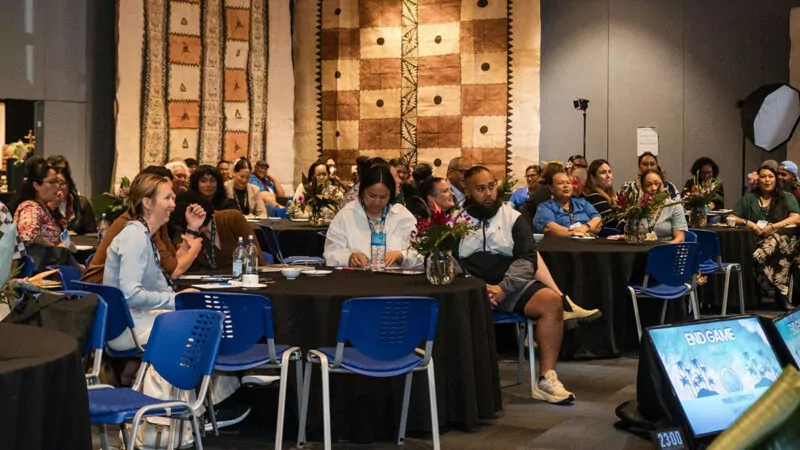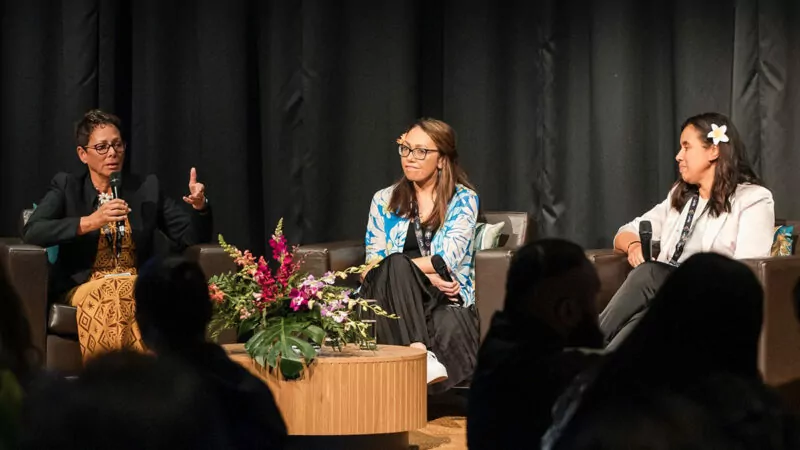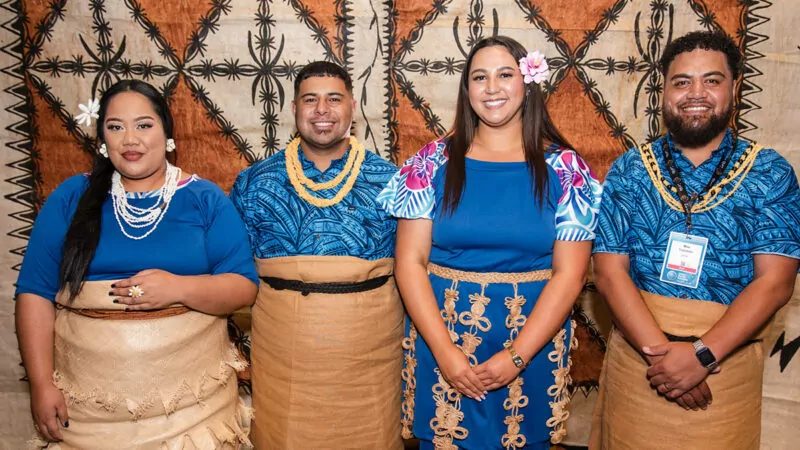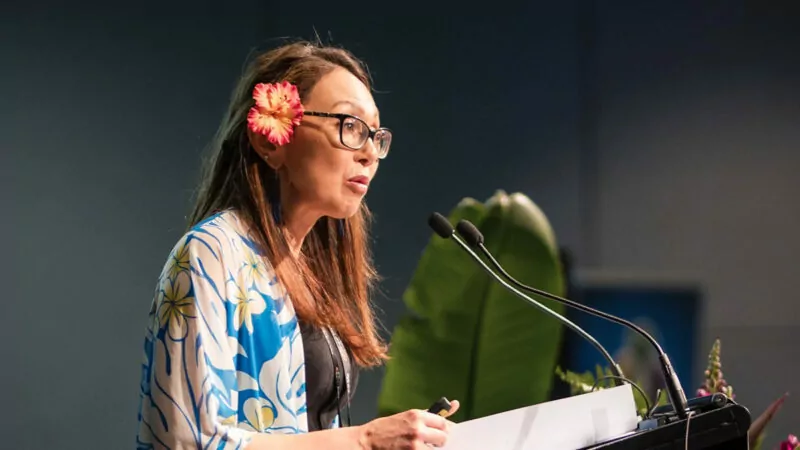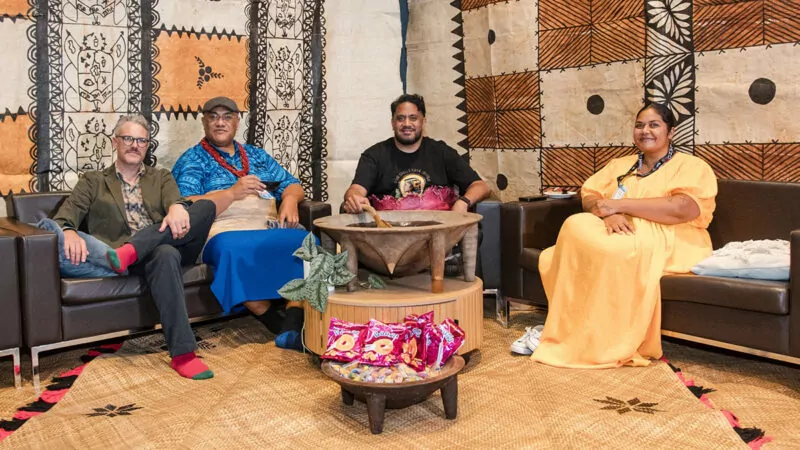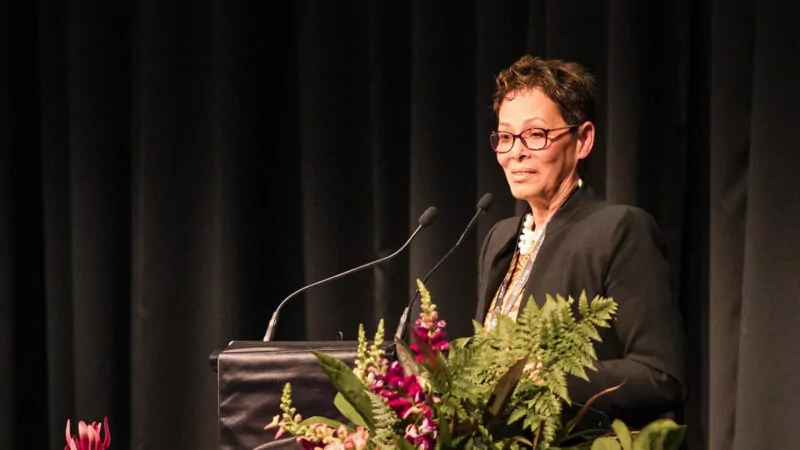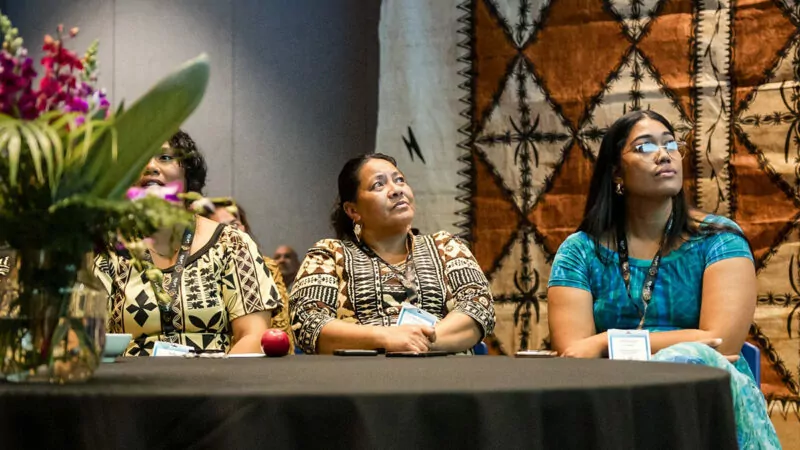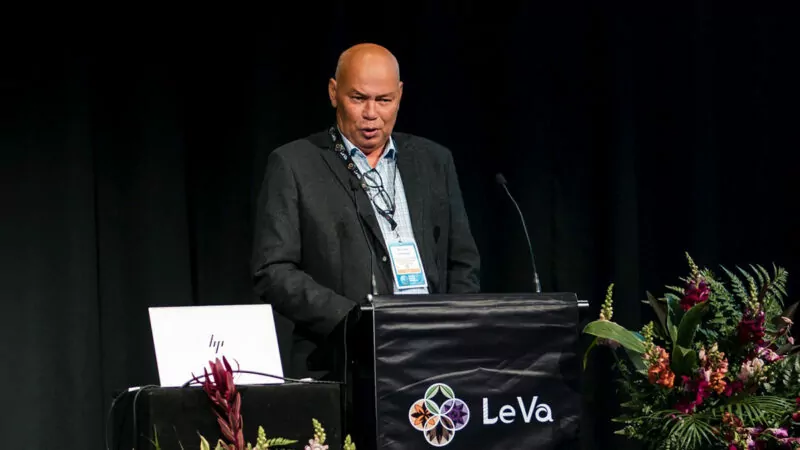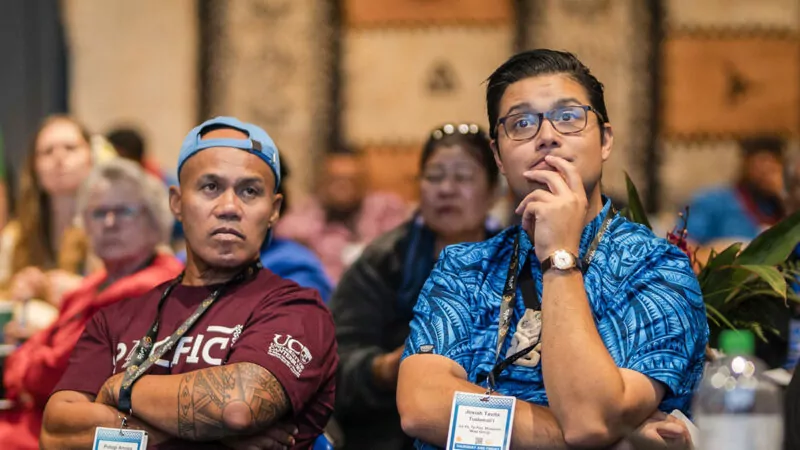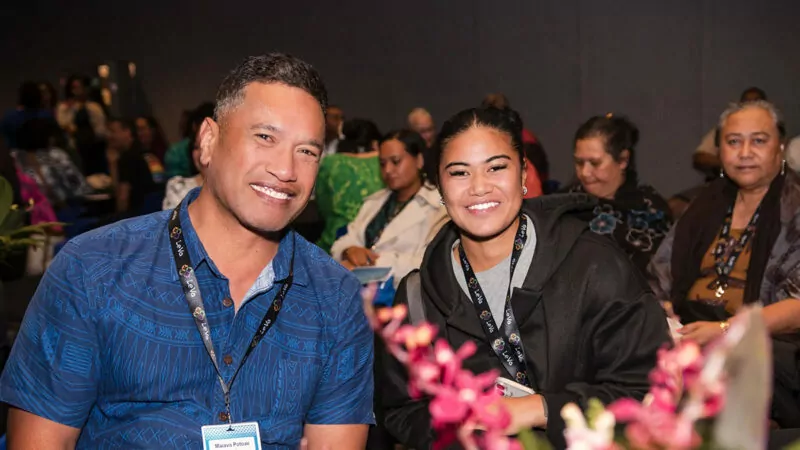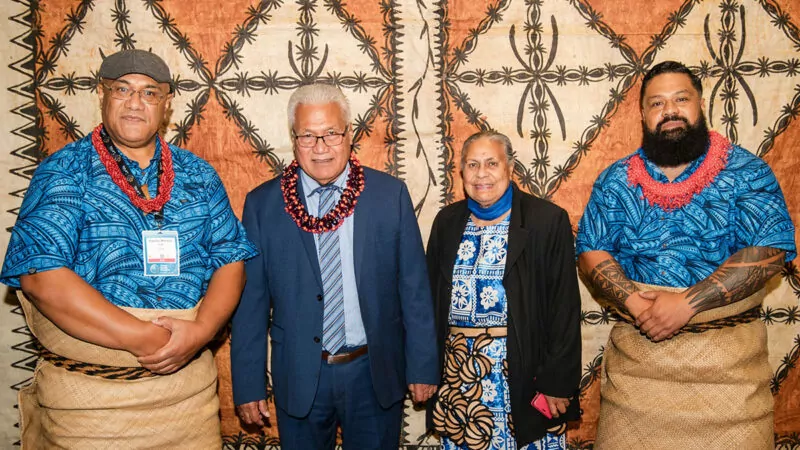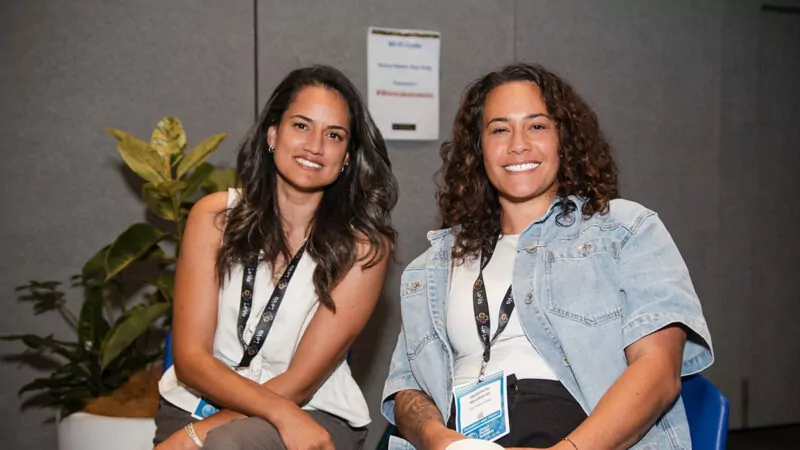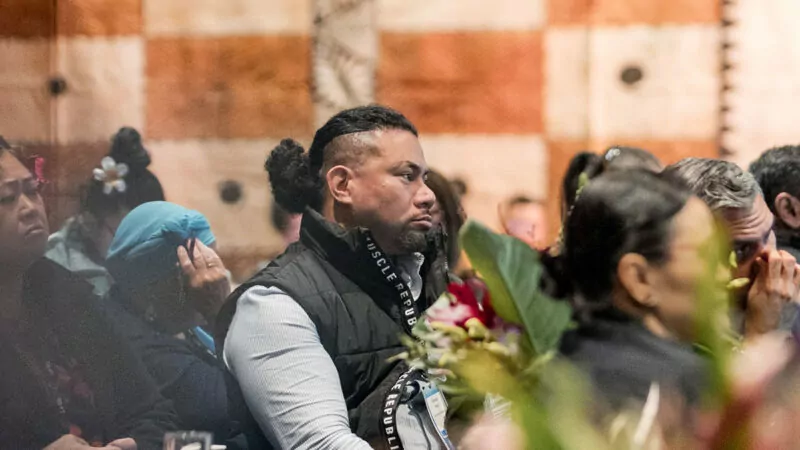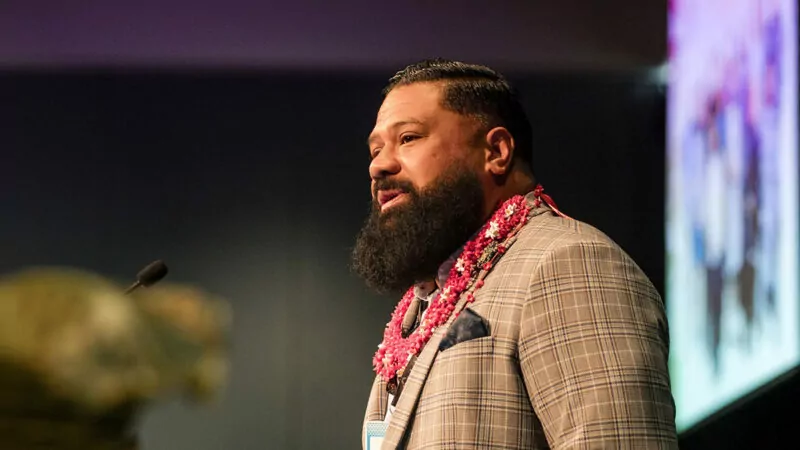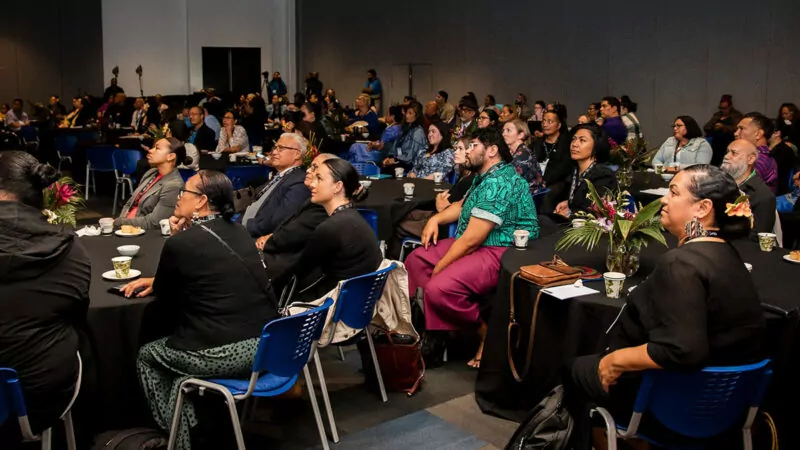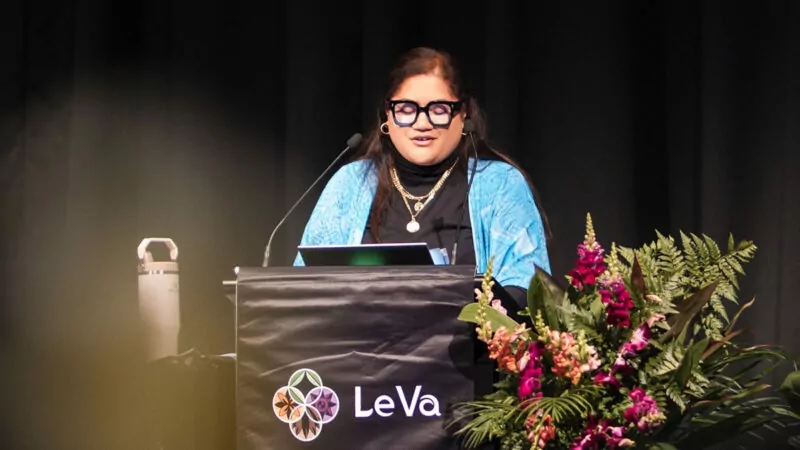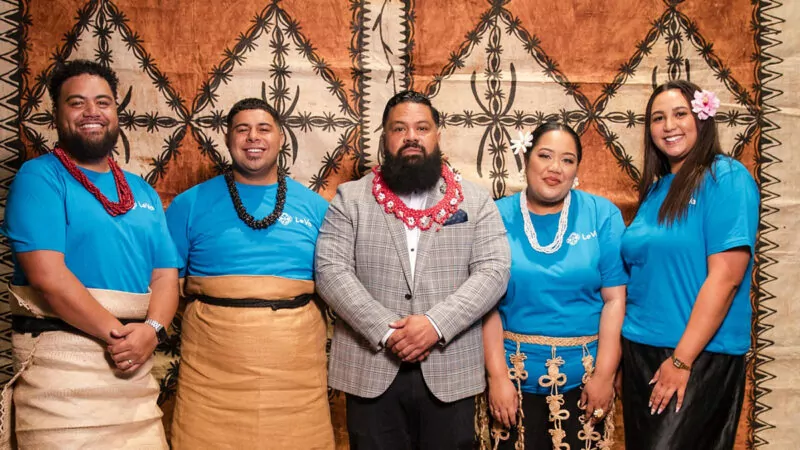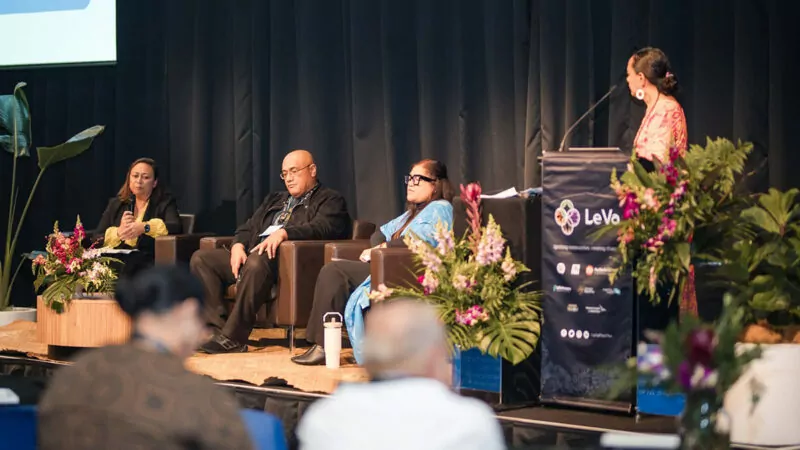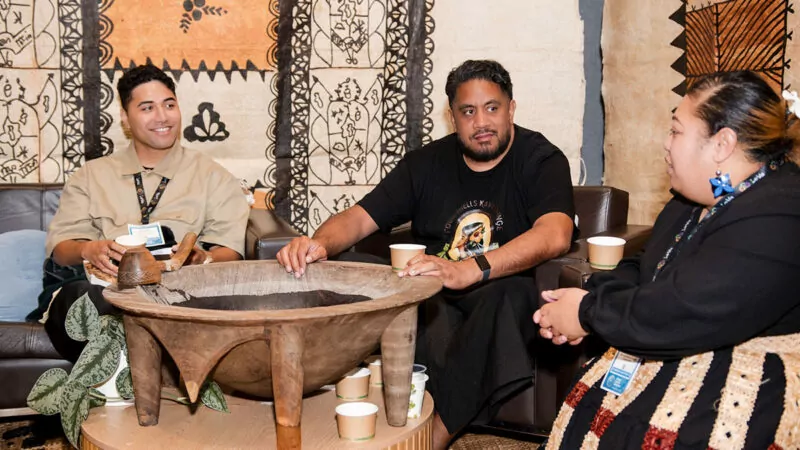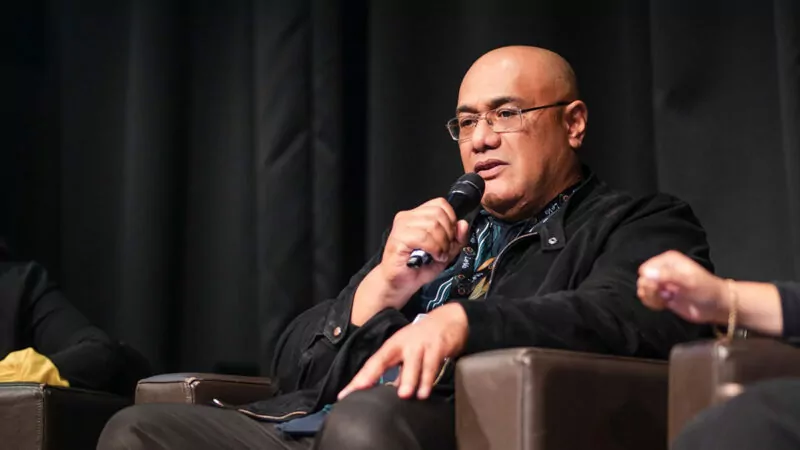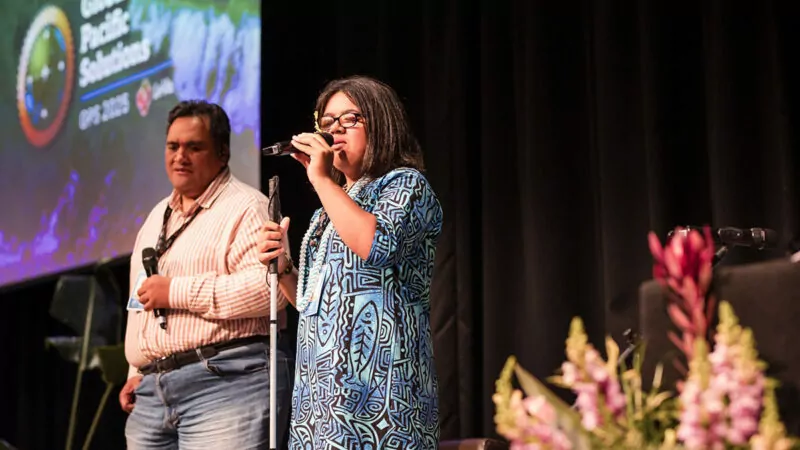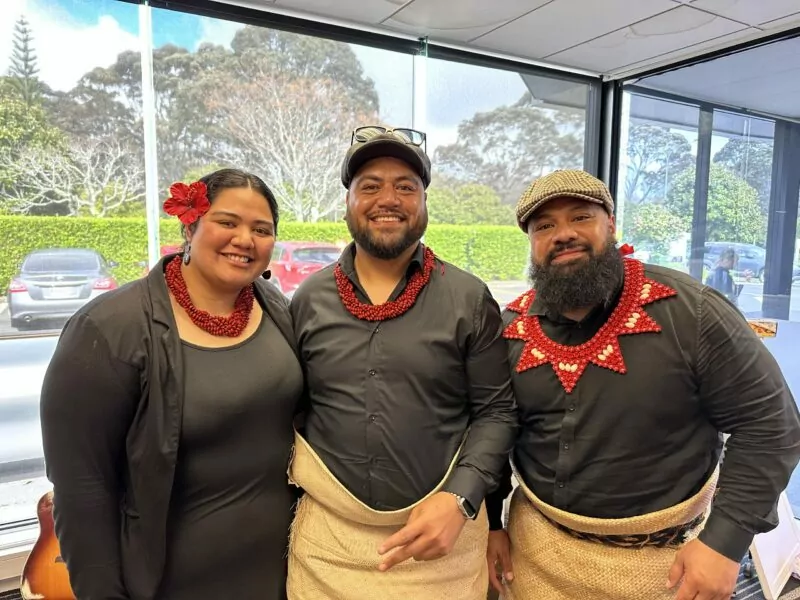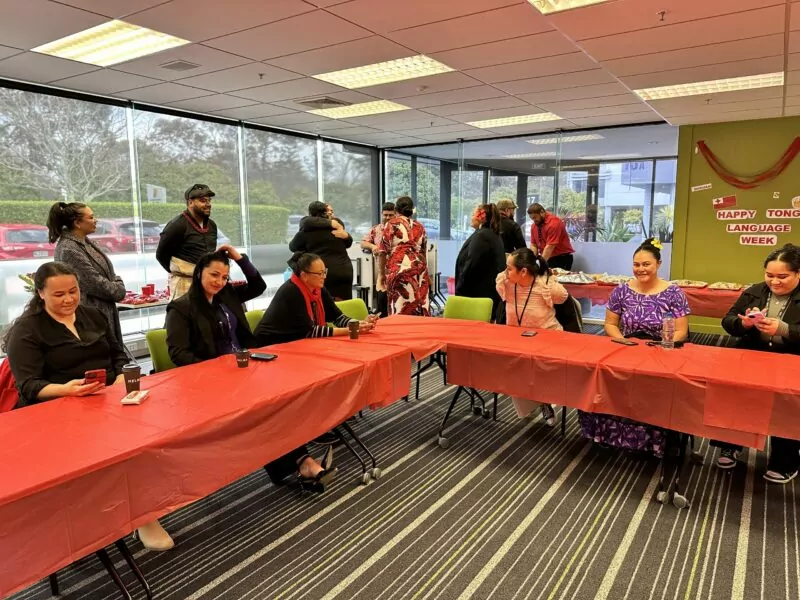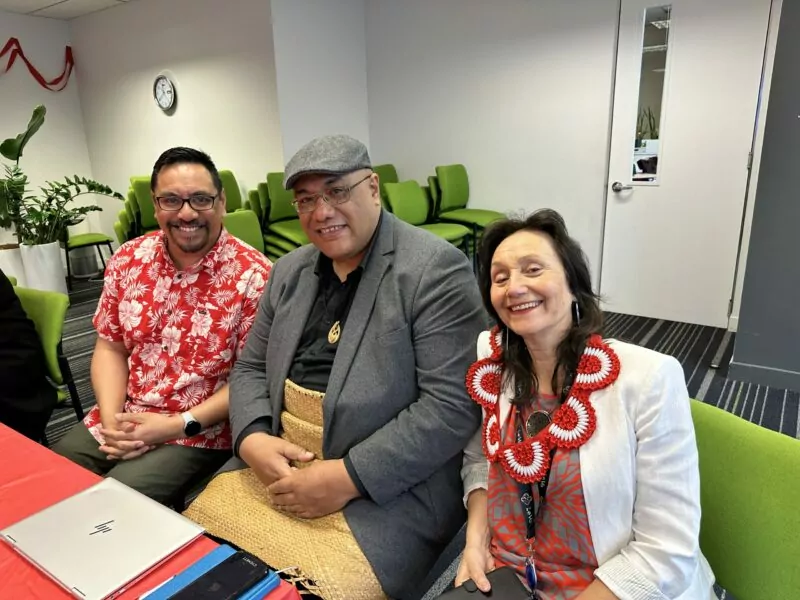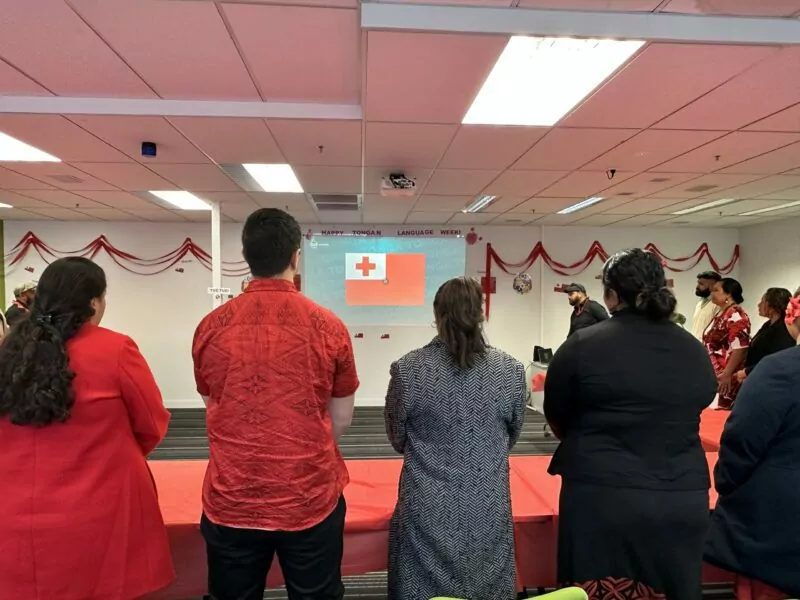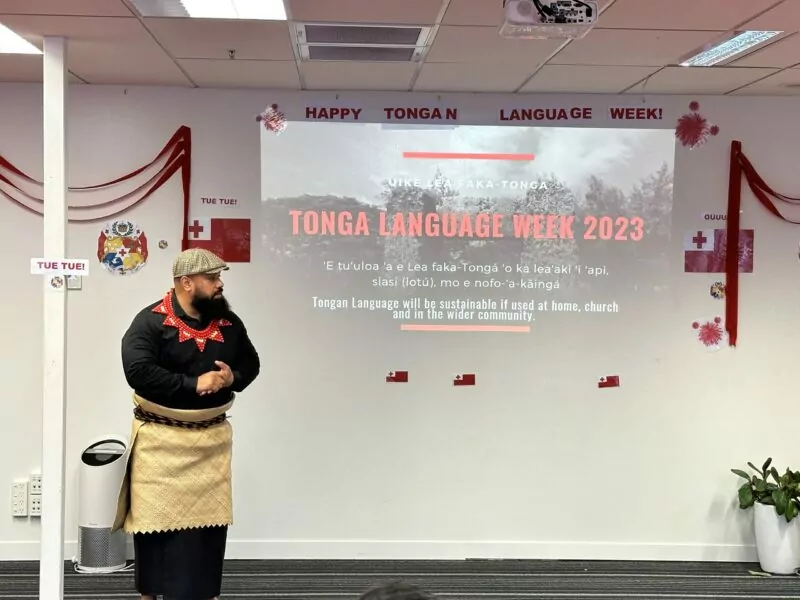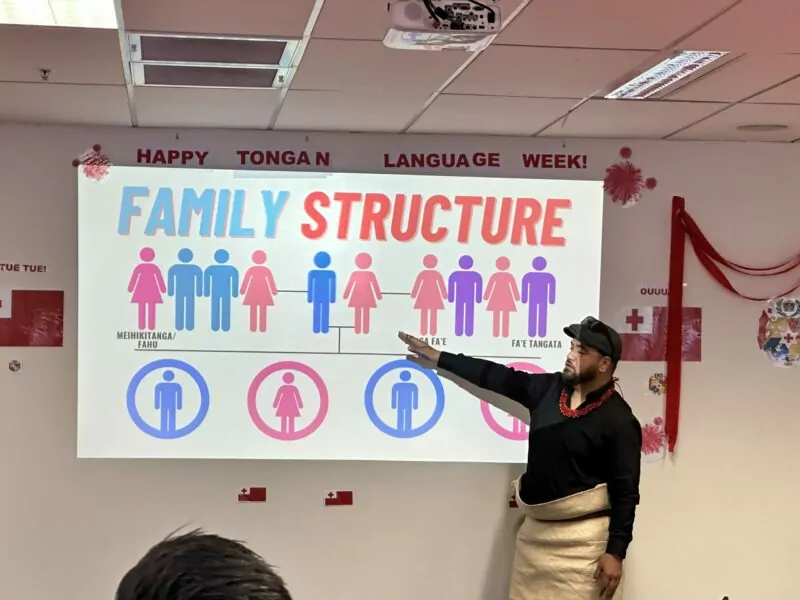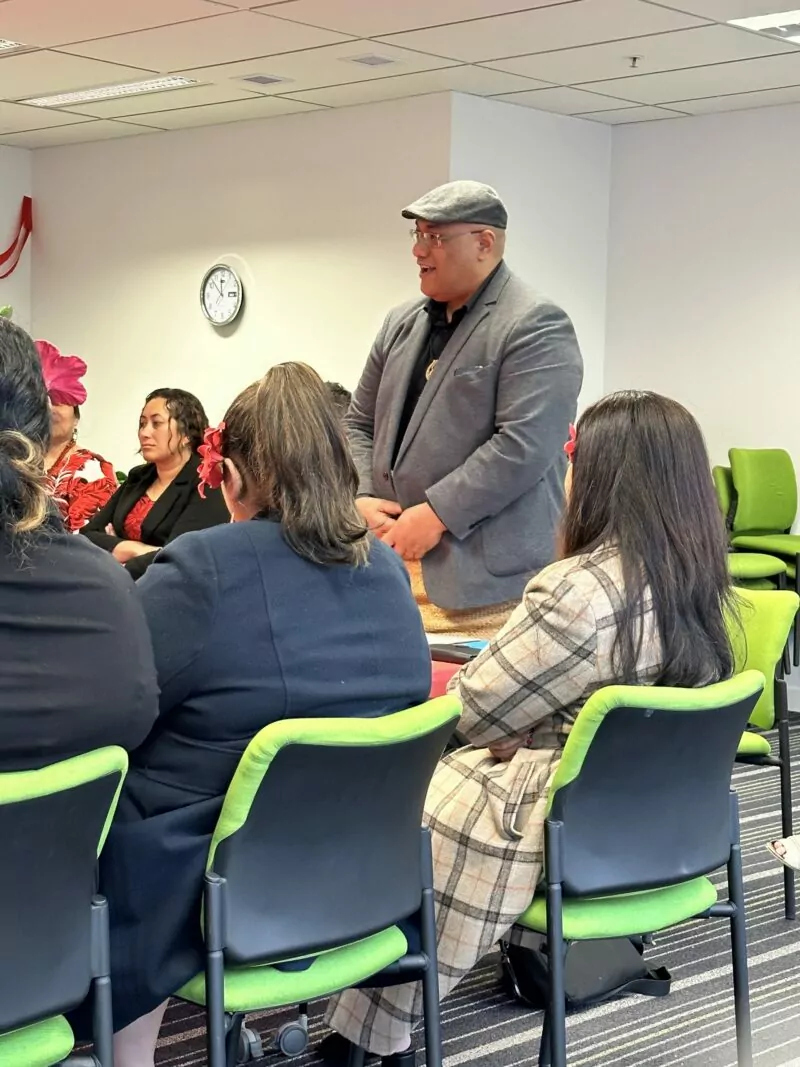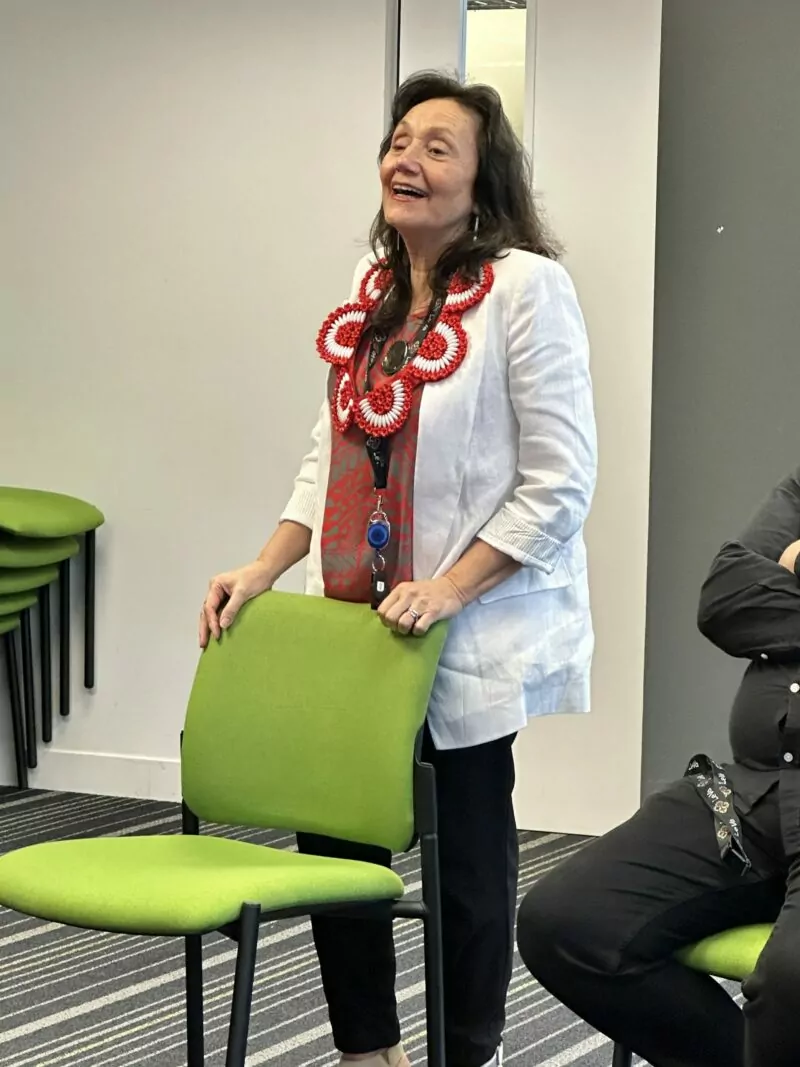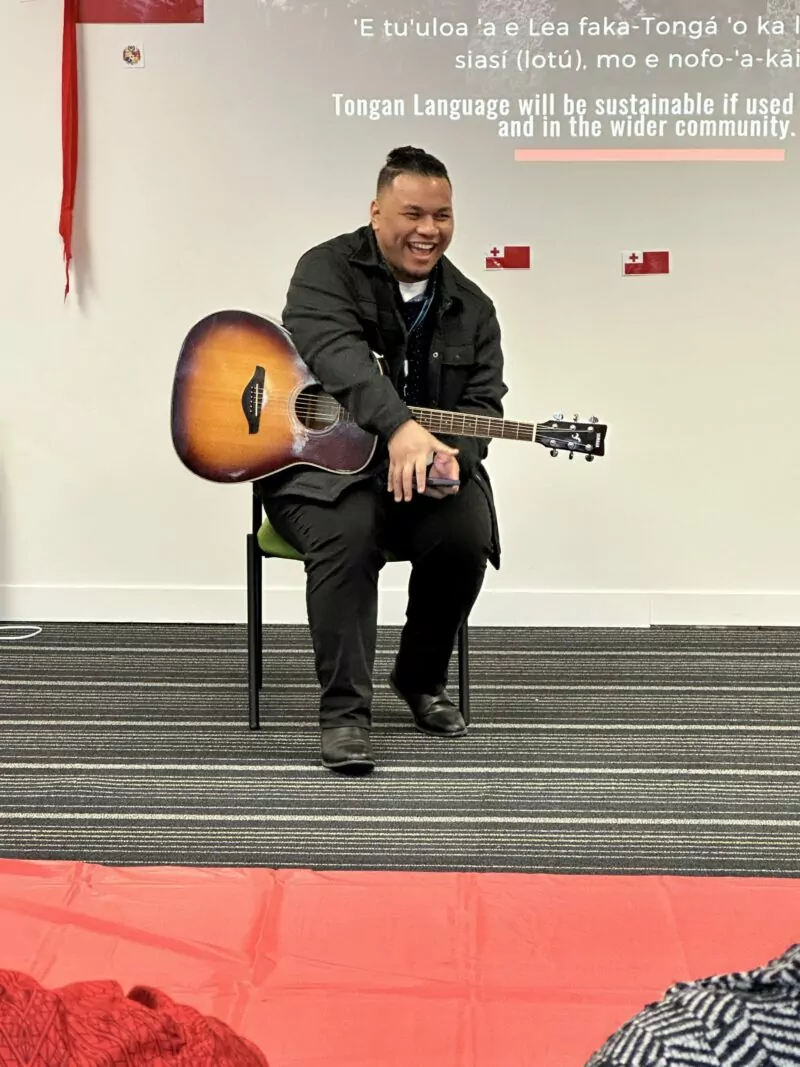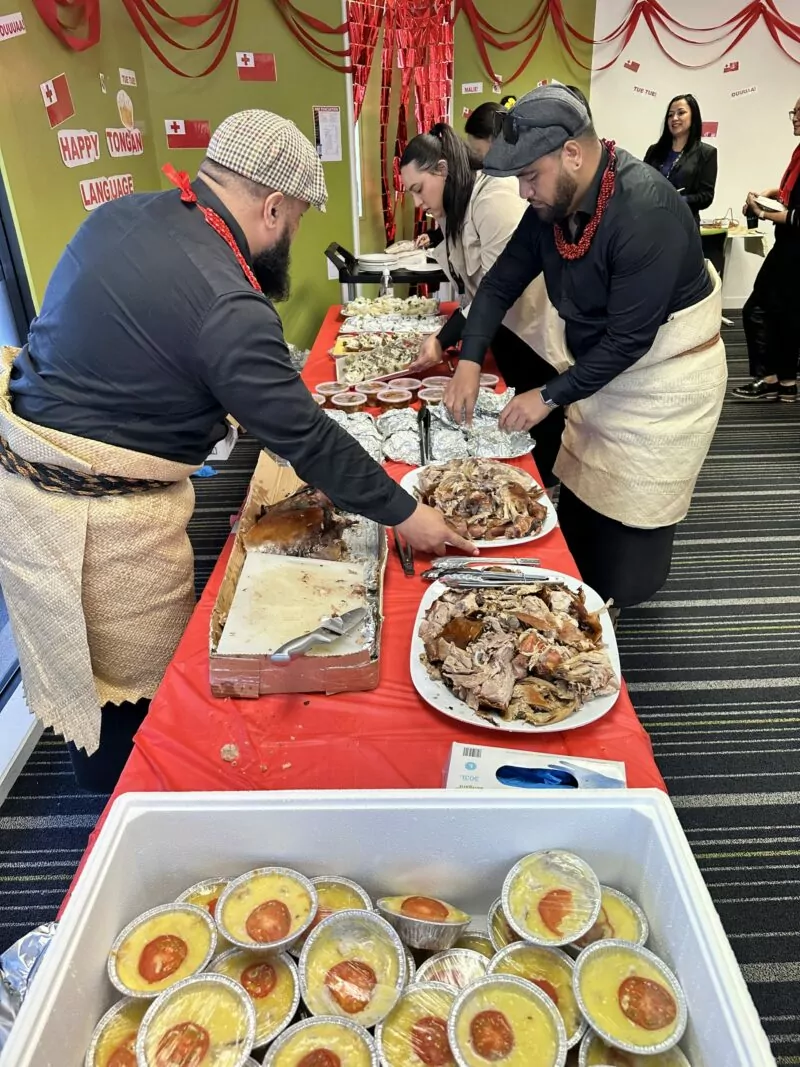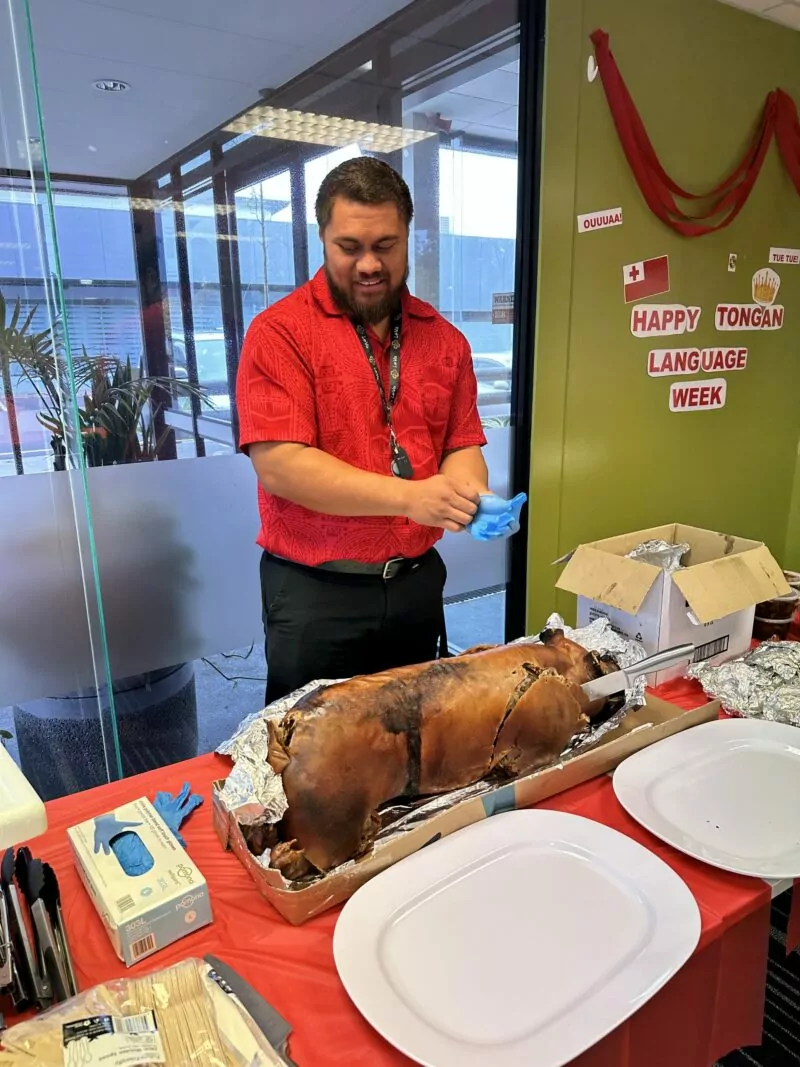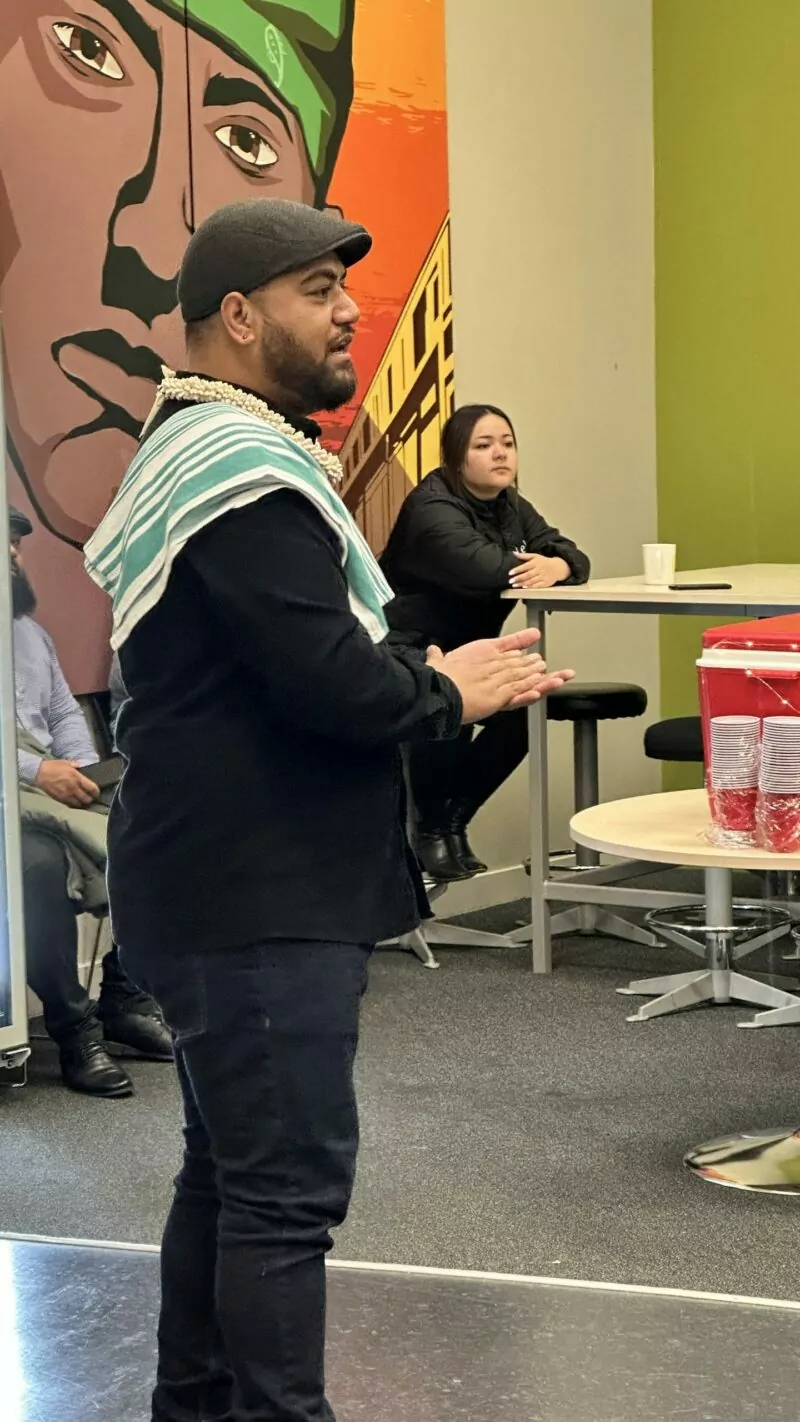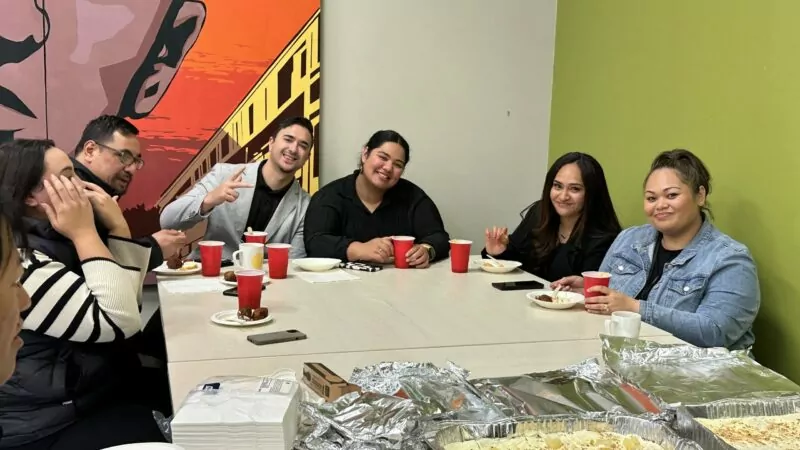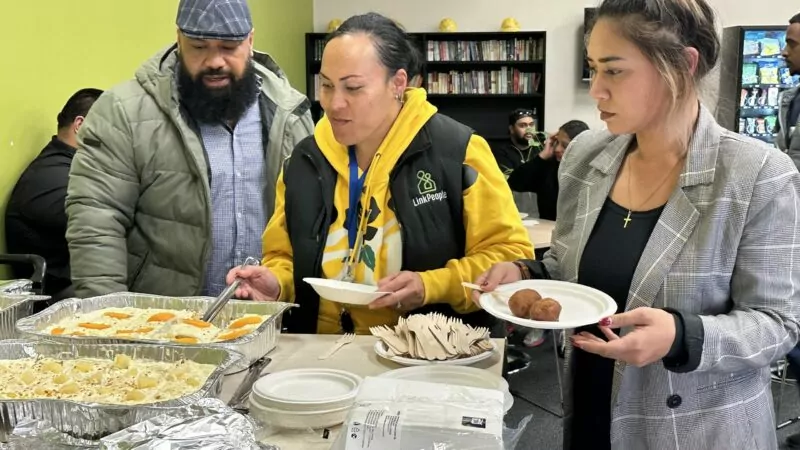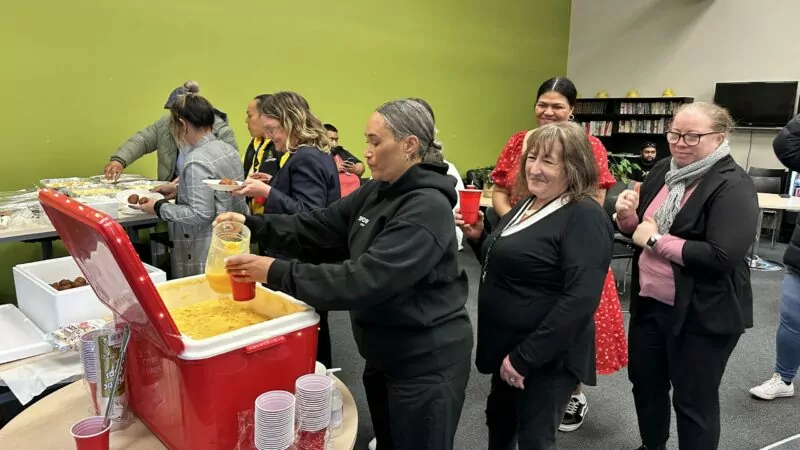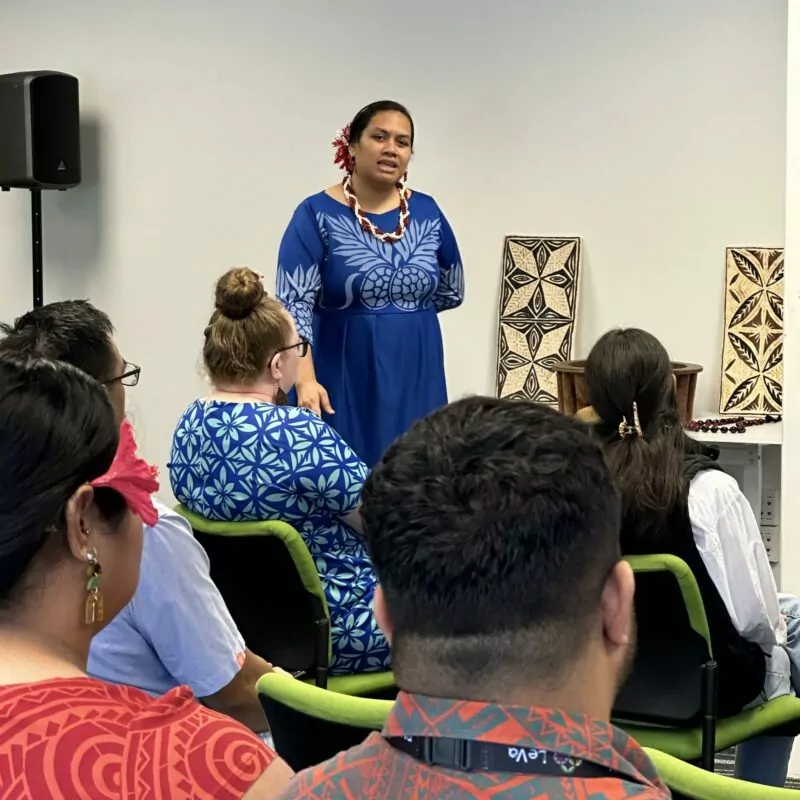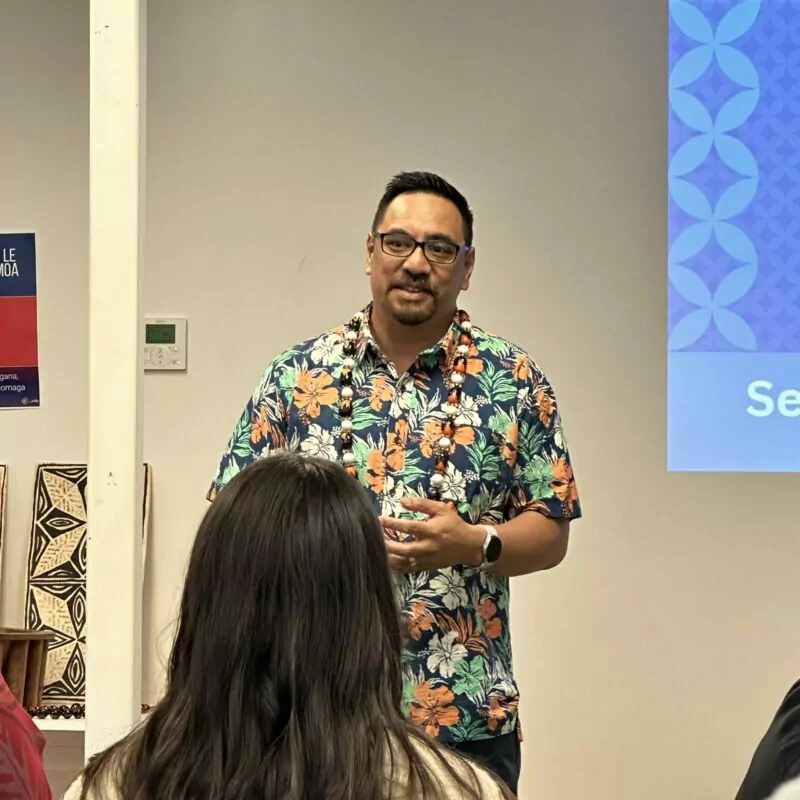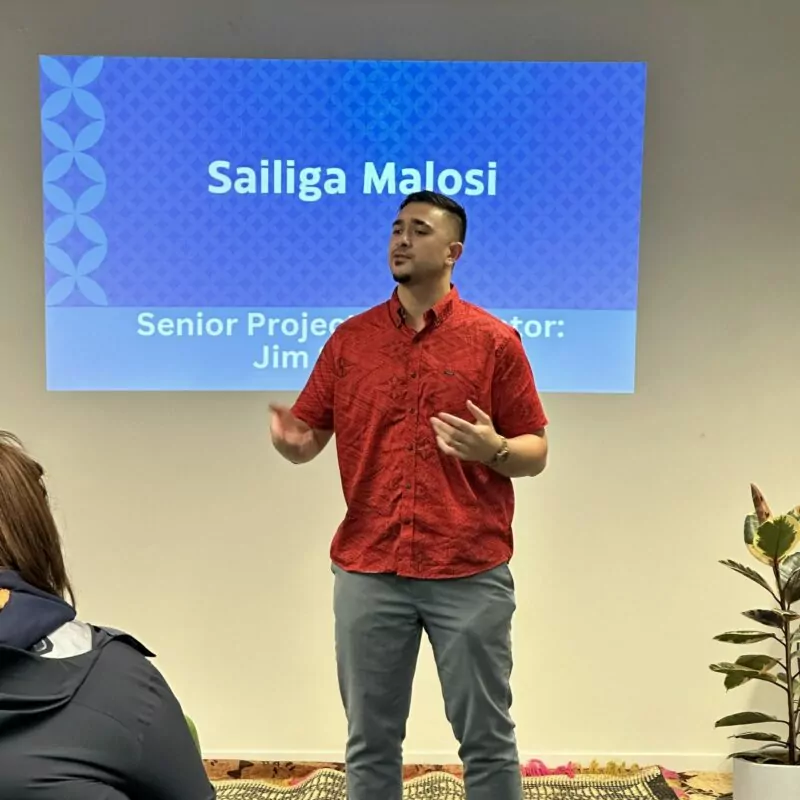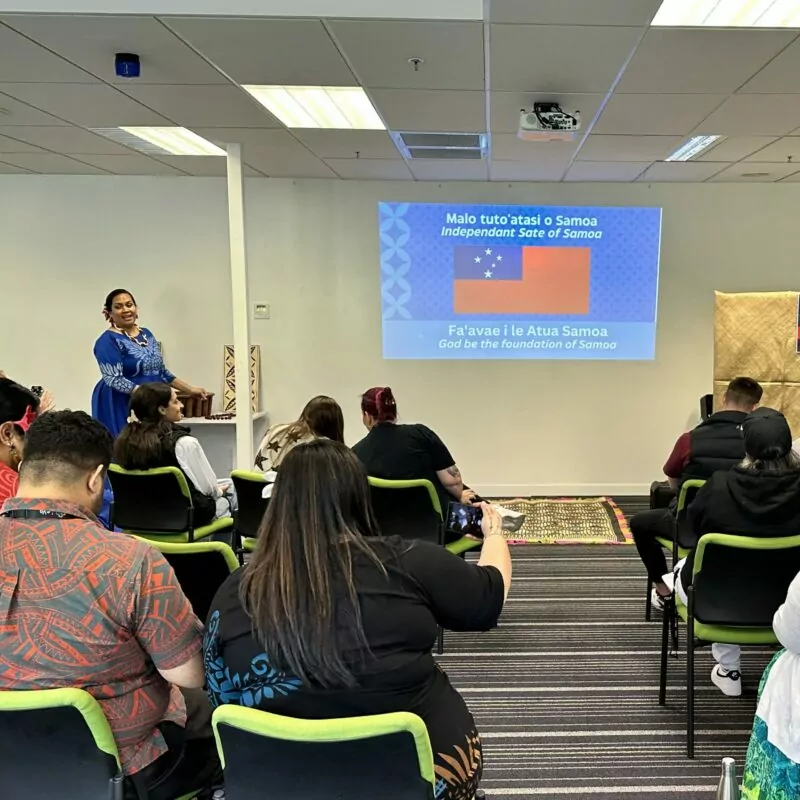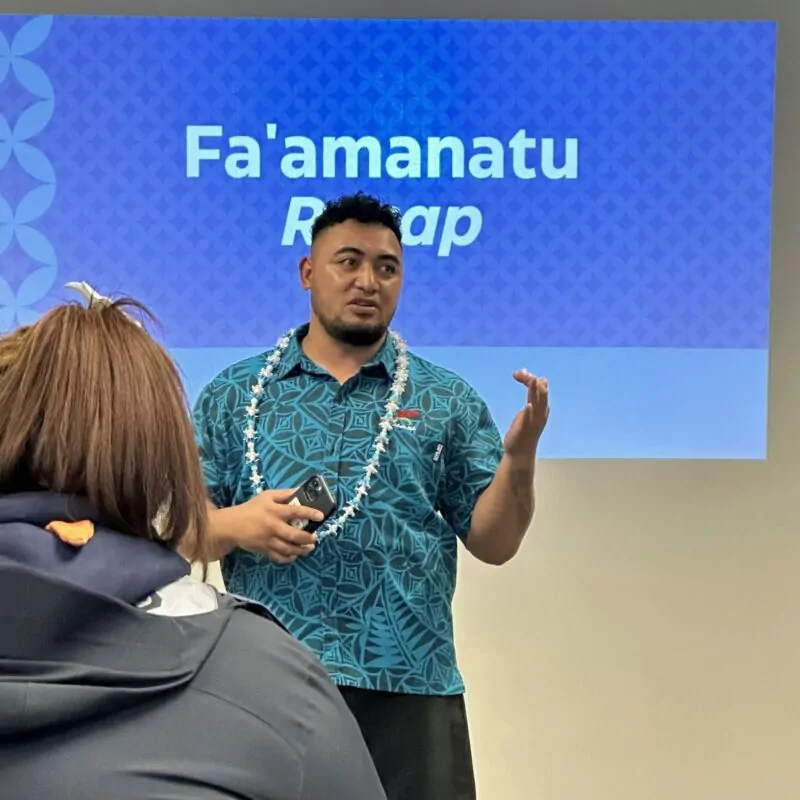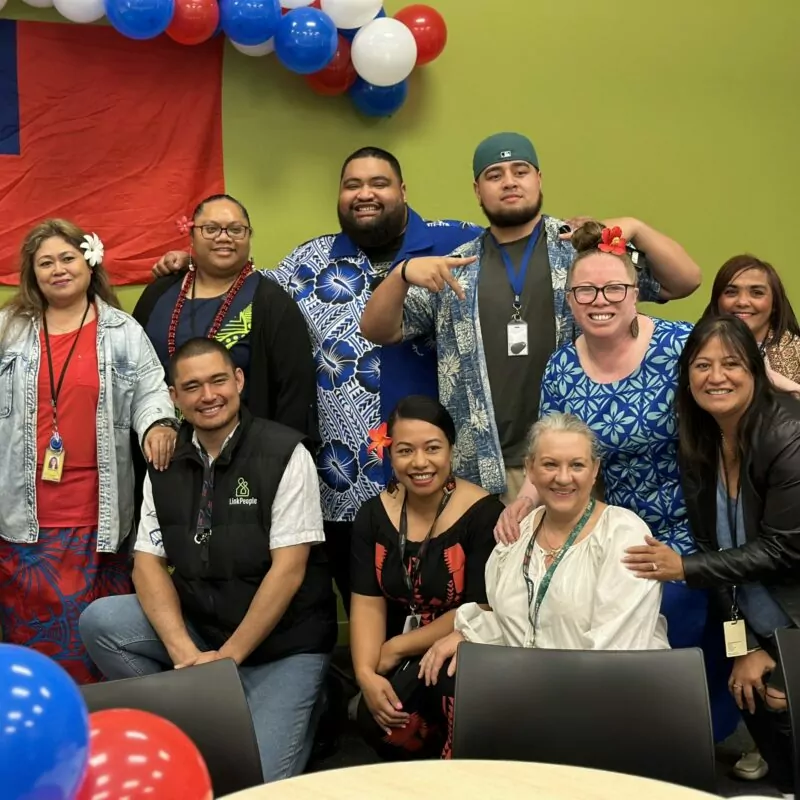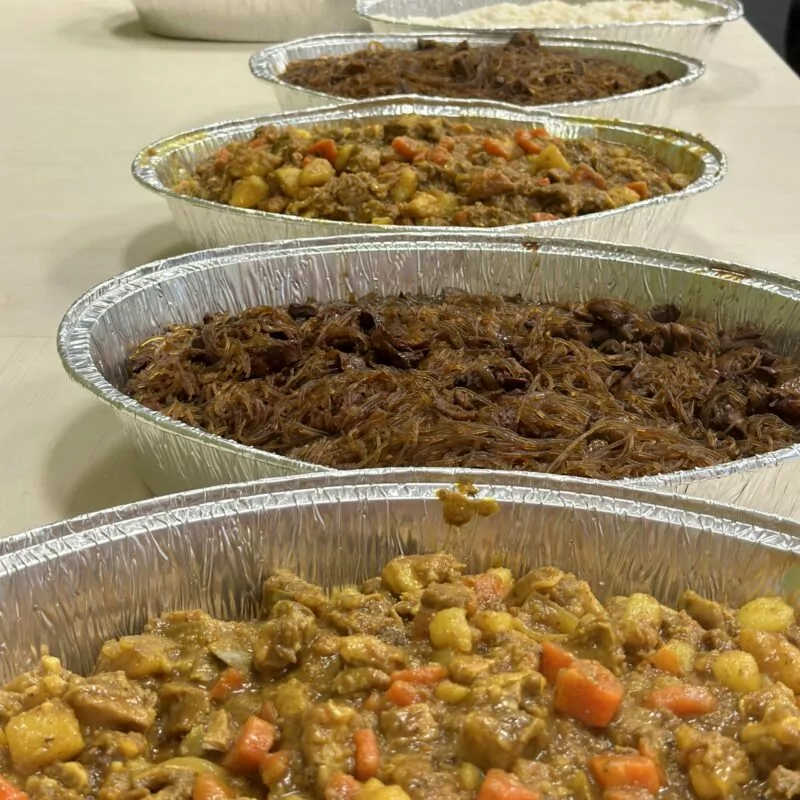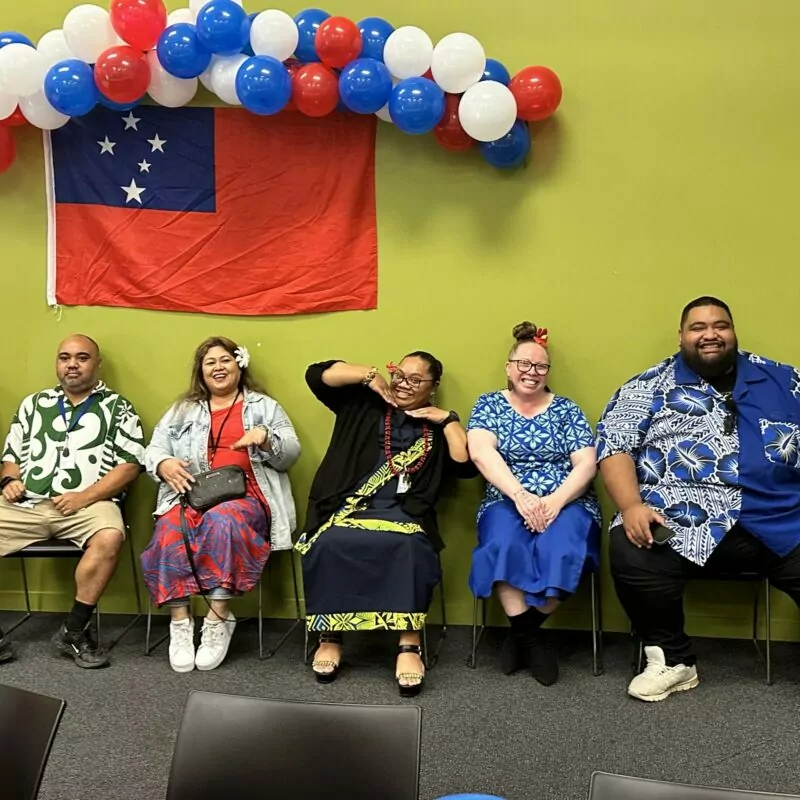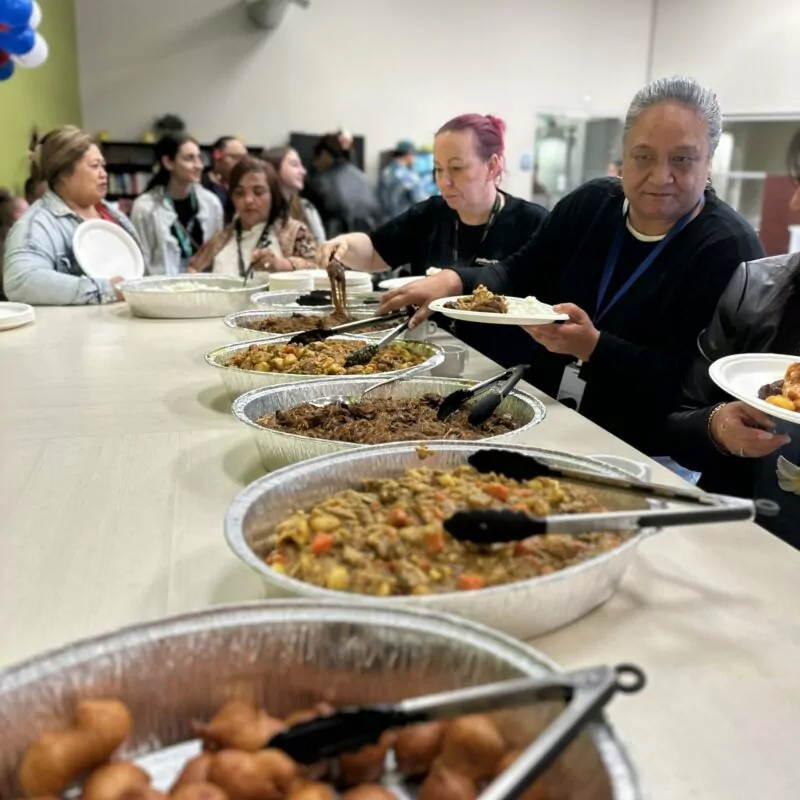Changing the narrative, navigating challenging tides, calling out injustices and centring the voices of Tangata Moana.
In the public health space, Le Va is tasked with creating opportunities for the village to gather, bringing together our Pacific public health workforce and sector providers to strengthen capability and grow capacity. By nurturing these connections and building a thriving workforce, we ensure that “when the coconut tree bears fruit, the village is nourished, and the children will flourish.”
Day One
On Day One of GPS 2025, we were privileged to hear from a powerful line-up of Pacific thought leaders bringing deep expertise and an unwavering commitment to equity, justice and community wellbeing.
We opened with a powerful morning session led by three inspiring Samoan wāhine leaders who reminded us of the importance of putting the growing generation first and staying grounded in purpose.
As Dame Teuila Percival shared, “Don’t fall in love with your business cards or the organisations you work for – fall in love with the children.”
Dr Corina Grey challenged us to reframe how we understand and use data. She spoke to the harmful impact of Pacific people being continually positioned in deficit through statistics and reinforced the need for our communities to lead the analysis and interpretation of data. “For us, by us,” was a powerful call to reclaim narrative control, where Pacific insight and leadership can turn data into solutions, not stigma.
Malaetogia Dr Jacinta Fa’alili-Fidow shared her journey toward completing her PhD, Vā o Tamaiti – a relational resilience framework for Pacific child wellbeing, grounded in Pacific values.
In the afternoon session, Prof. Sir Collin Tukuitonga’s passion for future generations of health workers was admirable. He emphasised that, while political cycles may come and go, we are here to stay and our response must be long-term and grounded in equity, data, justice and Pacific values. His challenge to the sector: “Speak up. Speak out.”
Dr Sione Faletau reminded us that identity and culture are inseparable from wellbeing and that art is not just expression, but an embodiment of who we are as Tangata Moana.
Our Kava Korner was also a much loved feature, thank you to everyone who visited over the two days. A special shoutout to Four Shells Kava Lounge for generously providing the kava and creating space for attendees to connect through this meaningful cultural practice.
The End Game stream was more than a conversation, it was a reaffirmation of the collective strength within our communities, and the transformative power of Pacific leadership in shaping a healthier, more equitable future.
Day Two
Day Two of GPS 2025 brought strong advocacy, honest talanoa and lived experience to the centre. Our speakers challenged us to confront stigma, while elevating the strengths, resilience, and aspirations of our Pasifika disabled communities.
Leuluaiali’i Catherine Poutasi shared her deep expertise on funding models in the disability space, guiding organisations on how to effectively access and utilise funding to deliver better outcomes for our people.
Pakilau Manase Lua reminded us that cultural identity is central to wellbeing. His call was clear Pacific worldviews must be upheld, not sidelined, when shaping policy and services.
Nalei Taufa presented key insights gathered from Le Va’s national talanoa series with Pacific disabled communities. She challenged the system to protect our stories and act on our data, not simply collect it and let it sit unused.
We also celebrated an exciting announcement from Sara-Jane Elika, trustee of Foundation North. Sara-Jane confirmed a new partnership with Le Va, launching a dedicated pool of funding for Pacific disability community initiatives a major step forward in resourcing grassroots solutions led by our own communities.
Our Faiva Ora Community Innovation Fund recipients Joshua Peauafi, Daniel Te’o and Tara Aumalesulu showcased their community-led projects, each rooted in their passions, lived experience and cultural values. Their courage, innovation, and leadership lit up the room, reminding us that the solutions are already within our villages.
‘E tu’uloa ‘a e Lea Faka-Tongá ‘o ka lea’aki ‘i ‘api, siasi (lotú), mo e nofo-‘a-kāingá – the Tongan language will be sustainable if used at home, church and in the wider community.
Ben Tameifuna, Senior Manager Disability and Public Health, opened Tonga Language Week at Le Va by introducing the theme for 2023: ‘E tu’uloa ‘a e Lea faka-Tongá ‘o ka lea’aki ‘i ‘api, siasí (lotú), mo e nofo-‘a-kāingá, meaning the Tongan language will be sustainable if used at home, church and in the wider community.
The Le Va team celebrated with a Tongan morning tea for their Harakeke House colleagues, sharing ‘otai (fruit drink), pineapple pie, and keke ‘isite (doughnuts). Max Tuipulotu, Senior Project Coordinator at Le Va and an experienced dancer and choreographer, demonstrated Tongan dance moves and blessed the food.
Later in the week, Le Va’s Tongan staff, including Chief Executive Denise Kingi-‘Ulu’ave, shared a presentation with their colleagues on their family backgrounds and Tonga’s history and culture. The feast that followed was full of laughter, music and fellowship.
In the lead up to World Suicide Prevention Day on 10 September, Le Va is highlighting the top five tactics for preventing suicide for Pasifika people. One of those tactics is ‘Cultural Identity’, with evidence showing that culture gives a sense of belonging and pride and is a protective factor for suicide.
The Pacific Language Weeks, supported by the Ministry for Pacific Peoples since 2010, are an opportunity to celebrate and promote the diversity of Pacific languages in Aotearoa, strengthening those cultural connections for our teams and for our communities.
Samoan is a complex language which means we’re always learning – even those of us who are fluent speakers are constantly deepening our knowledge of Gagana Samoa. – Toleafoa Mark Esekielu
Celebrations at Harakeke House throughout the week began with a welcome and official opening led by Taitu’uga Mataafa-Komiti, Le Va’s project manager for the Atu-Mai violence prevention programme. She gave a short presentation on Samoan history, culture and language and a fun lesson on how to pronounce some Samoan phrases.
Pastor Taeao Napo, project coordinator at Le Va, opened the gathering with lotu (prayer) and pese (hymns). Project coordinator Jim Stretton entertained guests with an energetic demonstration of different styles of Samoan siva (dance).
To end the week, the Le Va team brought together staff from all the Wise Group entities at Harakeke House once again to reflect on the week and enjoy a taumafataga (shared meal). The refreshments, which included koko alaisa, panikeke, and falaoa, were prepared by project coordinator and Samoan chef extraordinaire, John Apelu Crouch.
Toleafoa Mark Esekielu, Le Va’s senior manager for mental health and addiction, said, “It’s important to acknowledge that we are all on a journey in terms of our language. Samoan is a complex language which means we’re always learning – even those of us who are fluent speakers are constantly deepening our knowledge of Gagana Samoa.”
In the 2018 census, 182,721 people identified as being ethnically Samoan, making them the largest group of Pacific peoples living in Aotearoa. After English and Te Reo Māori, Samoan was the third most widely spoken language in New Zealand, with 86,403 people (2 per cent of the population) able to speak it.
Minister for Pacific Peoples Hon Barbara Edmonds launched Samoan Language Week nationally online with a video focusing on this year’s theme, ‘Mitamita i lau gagana, maua’a lou fa’asinomaga’, meaning ‘Be proud of your language and grounded in your identity’.
Imagine a world where Pasifika people with disabilities have access to all the services they need. A world without language or cultural barriers, and where Pasifika people with disabilities can live the life they want the way they want. Le Va is working with disability support services, communities, and others to develop such a world, right here in Aotearoa.
A disability workforce with capability, cultural competency and capacity is required to effectively engage with Pasifika communities and deliver effective disability support services that are responsive to their cultural needs.
The Engaging Pasifika cultural competency programme has been in high demand for our disability workforce, with the most disability workers ever undertaking the programme in the past 12 months compared to previous years. In total 213 disability health workers completed the Engaging Pasifika programme from over 30 organisations.
In addition, many other disability workers attended both open face to face Engaging Pasifika workshops and EP live online webinars.
Since 2013, more than 1580 disability health workers completed Engaging Pasifika Cultural Competency programme.
100% of disability participants rated the Engaging Pasifika programme as an excellent programme overall!
The delivery of Le Va’s national Engaging Pasifika Cultural Competency programme commenced in 2009.
To date, over 6 400 health workers have completed the programme, 900 of which were delivered in 2019-2020 alone. This year during COVID lockdown level 4 restrictions, EPLive Online Webinar was launched where 176 health workers completed the programme.
The New Zealand Health profile shows that Pasifika is generally featured disproportionately compared to the rest of the nation. Developing a diverse health workforce that reflects the regional population served is one of many ways to address this, however, this takes time. Supporting mainstream workers and services to enhance their cultural responsiveness is another way and is recognised as an essential means to reduce ethnic disparities in access, quality and outcomes for health and disability services. Research commissioned by the Ministry of Health on how to best meet the needs of Pasifika young people with disabilities identified cultural competency of workers and services as part of the solution in providing a better quality of care for the young person and their family.
Engaging Pasifika 2019-2020 infographic